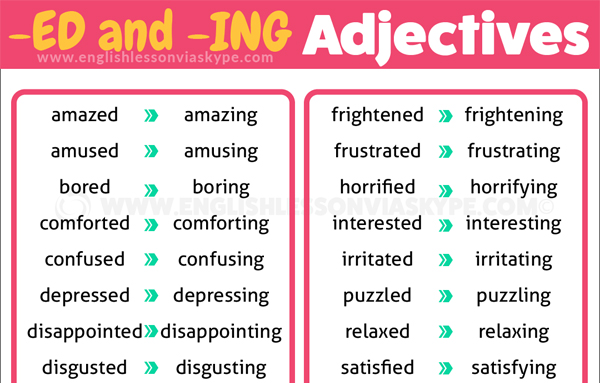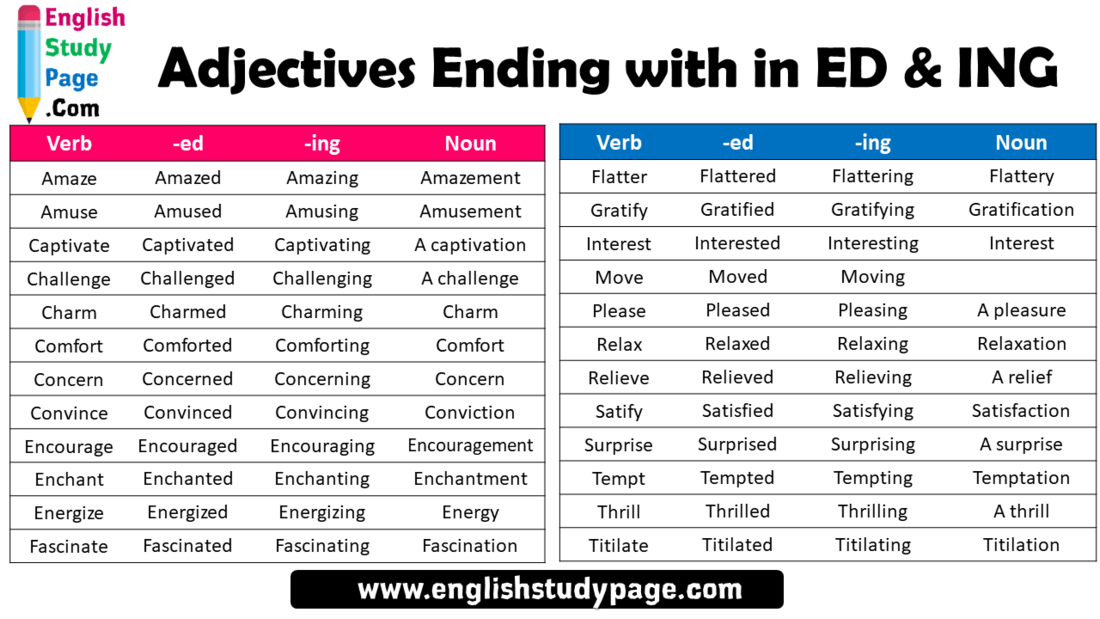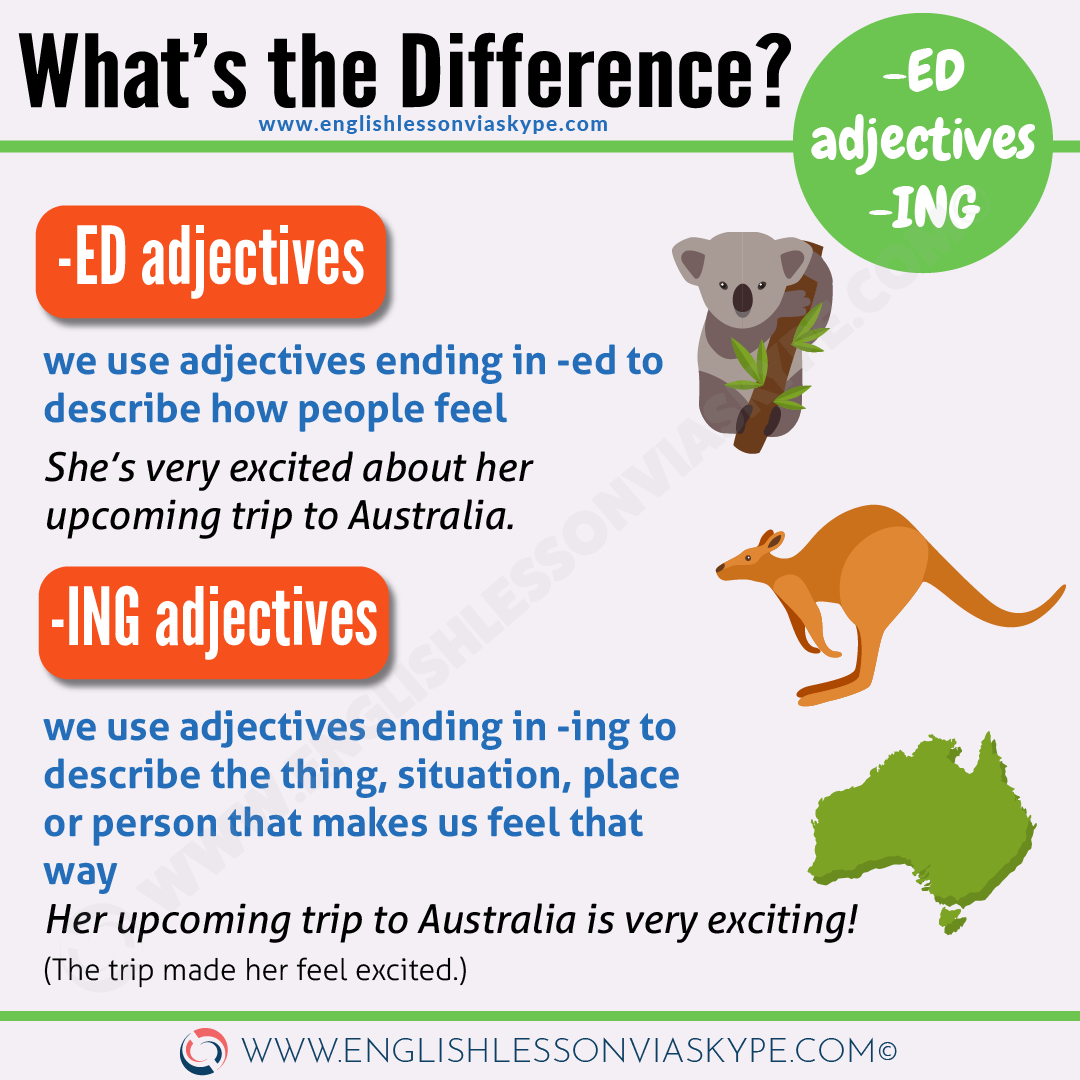
HEADLINES / Today / November 3, 2024
Adjectives Ending In Ed And Ing Useful List Great Examples вђў 7esl
Adjectives Ending in ED and ING: Master Their Usage in ... - 7ESL: Adjectives ending in -ed and -ing are a unique and important part of the language that allows us to describe people, places, and things in a more nuanced way. Adjectives ending in -ing describe the quality of the noun as it is in the process of being or doing something, while adjectives ending in -ed describe the quality of the noun after the .... Adjective Suffixes: Useful List and Great Examples - 7ESL: Examples: beautiful, powerful, successful.

Adjectives Ed Ing
-ic: This suffix is used to form adjectives that pertain to or show a characteristic of a specific noun. Examples: scientific, artistic, romantic. -ive: This suffix generates adjectives that express the tendency or disposition of a certain action or behavior.. 64 Common -ed and -ing adjectives & How to use them: Amanda N August 21, 2023. Many English adjectives are formed with a verb plus an -ed or -ing ending. Some common examples of -ed and -ing adjectives are: Excited/exciting. Interested/interesting.

ED / ING Adjectives. - YouTube
Bored/boring. Tired/tiring. Surprised/surprising. We use these kinds of adjectives to talk about feelings and emotions, and the things that cause .... Adjectives ending in ED and ING - Grammar: There is quite a long list of adjectives ending in -ED and -ING in English, and most of them are based on a verb that can be changed into an adjective by adding either -ED or -ING. Some of the more common ones include: Alarmed - Alarming. Aggravated - Aggravating. Amused - Amusing.. Adjectives ending in '-ed' and '-ing' - LearnEnglish: Grammar test 1: Adjectives ending in '-ed' and '-ing' Read the explanation to learn more.

Adjectives Ending With In ED & ING - English Study Page
Grammar explanation. Adjectives that end in -ed (e.g. bored, interested) and adjectives that end in -ing (e.g. boring, interesting) are often confused.-ed adjectives. Adjectives that end in -ed generally describe emotions – they tell us how people feel.. List of Words Ending in ING and ED in English - ESLBUZZ: Words Ending in ING! Following is a list of adjectives ending in -ed and -ing. We form some adjectives from verbs by adding -ing or -ed endings to them. Adjectives that end -ed and adjectives that end -ing are often confused.

How To Use English Adjectives Ending In ED And ING - English With Harry
We can use the following words before adjectives ending in -ING and -ED: extremely, quite, very, not very, not….. Adjectives - 7ESL: Adjectives are an essential part of speech that modify and describe nouns. Nouns, on the other hand, are words that represent a person, place, thing, or idea. For example, consider the sentence: “The beautiful flowers bloomed in the garden.”. Here, “beautiful” is the adjective that modifies the noun “flowers.”.. ESL Radius - Adjectives Ending in "ed" vs "ing": Adjectives that end in -ing are used to describe things, people, places, and activities. In other words, these adjectives tell us what evoked the feelings in the first place by describing the characteristic of the thing. (These things are the "causes or sources of feelings") Examples of sentences containing adjectives that end in -ing used to ....

Adjectives Ending In Ed And Ing
Adjectives Ending in ED and ING: Master Their Usage in ... - 7ESL
Adjectives ending in -ed and -ing are a unique and important part of the language that allows us to describe people, places, and things in a more nuanced way. Adjectives ending in -ing describe the quality of the noun as it is in the process of being or doing something, while adjectives ending in -ed describe the quality of the noun after the ...
64 Common -ed and -ing adjectives & How to use them
Amanda N August 21, 2023. Many English adjectives are formed with a verb plus an -ed or -ing ending. Some common examples of -ed and -ing adjectives are: Excited/exciting. Interested/interesting. Bored/boring. Tired/tiring. Surprised/surprising. We use these kinds of adjectives to talk about feelings and emotions, and the things that cause ...
Adjectives - 7ESL
Adjectives are an essential part of speech that modify and describe nouns. Nouns, on the other hand, are words that represent a person, place, thing, or idea. For example, consider the sentence: “The beautiful flowers bloomed in the garden.”. Here, “beautiful” is the adjective that modifies the noun “flowers.”.
Adjective Suffixes: Useful List and Great Examples - 7ESL
Examples: beautiful, powerful, successful. -ic: This suffix is used to form adjectives that pertain to or show a characteristic of a specific noun. Examples: scientific, artistic, romantic. -ive: This suffix generates adjectives that express the tendency or disposition of a certain action or behavior.
ESL Radius - Adjectives Ending in "ed" vs "ing"
Adjectives that end in -ing are used to describe things, people, places, and activities. In other words, these adjectives tell us what evoked the feelings in the first place by describing the characteristic of the thing. (These things are the "causes or sources of feelings") Examples of sentences containing adjectives that end in -ing used to ...
Adjectives ending in '-ed' and '-ing' - LearnEnglish
Grammar test 1: Adjectives ending in '-ed' and '-ing' Read the explanation to learn more. Grammar explanation. Adjectives that end in -ed (e.g. bored, interested) and adjectives that end in -ing (e.g. boring, interesting) are often confused.-ed adjectives. Adjectives that end in -ed generally describe emotions – they tell us how people feel.
Adjectives ending in ED and ING - Grammar
There is quite a long list of adjectives ending in -ED and -ING in English, and most of them are based on a verb that can be changed into an adjective by adding either -ED or -ING. Some of the more common ones include: Alarmed - Alarming. Aggravated - Aggravating. Amused - Amusing.
List of Words Ending in ING and ED in English - ESLBUZZ
Words Ending in ING! Following is a list of adjectives ending in -ed and -ing. We form some adjectives from verbs by adding -ing or -ed endings to them. Adjectives that end -ed and adjectives that end -ing are often confused. We can use the following words before adjectives ending in -ING and -ED: extremely, quite, very, not very, not….
Related for Adjectives Ending In Ed And Ing Useful List Great Examples вђў 7esl
It is a capital mistake to theorize before one has data. Insensibly one begins to twist facts to suit theories, instead of theories to suit facts.
Keep Yourself Updated By Following Our Stories From The Whole World
Keep yourself updated with the latest stories from across the globe! Our platform brings you real-time insights and breaking news, covering everything from major world events to inspiring local stories. By following our stories, you’ll stay informed on a diverse range of topics and perspectives from around the world. Whether it’s political shifts, cultural milestones, or groundbreaking innovations, we ensure you’re always connected to what matters most. Dive into our global coverage and stay informed, no matter where you are!



